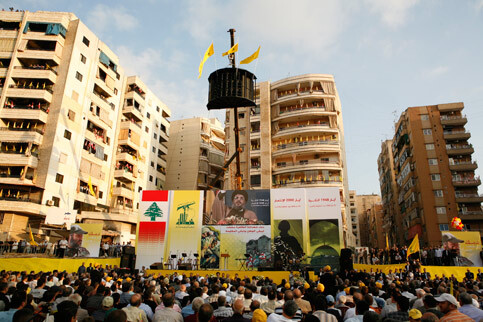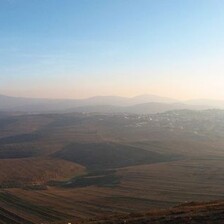Electronic Lebanon 11 June 2008

Hizballah General Secretary Hassan Nasrallah speaks in the suburbs of Beirut one day after the election of Lebanon’s new president, Michel Suleiman, 26 May 2008. (Matthew Cassel)
In May of this year, tension between the US-backed March 14 governing coalition and the Hizballah-led March 8 opposition culminated in armed clashes in Beirut and elsewhere around Lebanon. Soon after, the feuding sides were invited to Doha, Qatar where a deal was struck that began the process of forming a new government and selecting a new president for the country. But after Doha, many are skeptical that the agreement is a long-term solution for the country, especially given the current state of the Lebanese economy.
Neo-liberal economic policies adopted by successive political parties since Lebanon’s 15-year civil war came to an end in 1990 have left the country in economic ruins. All of the main political parties neglect the growing poverty rates, crumbling economy and staggering emigration in Lebanon today.
Karim Makdisi, a professor in the Department of Political Studies and Public Administration at the American University of Beirut, spoke with Stefan Christoff about Doha and the economic and social policies of the government and opposition forces in Lebanon.
Stefan Christoff: In recent weeks Lebanon has been dragged through another major political crisis, a conflict pitting the western-backed government lead by Prime Minister Fouad Siniora against the opposition lead by Hizballah. In your recent article, “In the wake of the Doha truce” you touched on larger issues facing Lebanon, the ongoing economic crisis, corruption in the country and the ongoing effects stemming from the 2006 Israeli attack on Lebanon. Can you talk about the major issues that you feel have been missing from mainstream media reporting on the ongoing political crisis in Lebanon?
Karim Makdisi: Lebanon is facing several critical issues. First, there is a tremendous social and economic crisis in this country, there is a 45 billion dollar debt, one of the largest debts per capita in the world, resulting from over a decade of neo-liberal economic policies that simply didn’t work throughout the 1990s.
In truth there is little opposition towards the economic policies that the government is putting forward, that is to say that the opposition in Lebanon is more or less in agreement with the government in regards to social and economic policy. Both the opposition and the government have attempted to sweep the main social and economic issues facing Lebanon under the carpet. This is one major issue.
SC: Concerning this point, can you explain how the current social and economic crisis in Lebanon impacts people’s daily lives in the country?
KM: Over the past couple years unemployment rates have gone up between 15-20 percent, as Lebanon’s economy is suffering due to major internal political crisis or military conflict in this country. Also there is a tremendous emigration happening, especially young people or youth who are leaving in droves, in search for jobs, a better life, a bit more stability than is possible to find in Lebanon today.
Poverty has risen dramatically in Lebanon in recent years, especially in areas outside of Beirut, in northern Lebanon, in southern Lebanon, in the Bekka valley and also in certain Beirut suburbs. Poverty has risen tremendously. State services from electricity, to phones, to water have all suffered also. Today there are many electricity cuts, also many water shortages and the summer season hasn’t yet began where traditionally there has always been regular water shortages and electricity cuts, so in this regard many are expecting a severe summer.
Also Lebanon is experiencing an environmental catastrophe today, both resulting from the Israeli attack in 2006 but also more generally an environmental disaster brought upon Lebanon over the past years. Lebanon’s coastline has been almost entirely privatized or destroyed due to pollution. Lebanon’s mountains are also being privatized. Many forests in Lebanon have been cut up. Air pollution is very, very high, while multiple important international environmental agreements have not been implemented in Lebanon.
Now the goal isn’t to paint a drastic picture, however it’s clear that today in Lebanon many social, environmental and economic indicators have simply been plunging in the past several years. This is not simply due to the political crisis over the past couple years, which has clearly made things much worse, but also due to very bad policies created during the 1990s within the supposed boom period for Lebanon.
All these major issues haven’t been addressed by either side. Even the opposition, including Hizballah, except on the margins doesn’t really mention or talk about the economic crisis. Actually this latest conflict covered up a very important issue in Lebanon.
Trade unions in Lebanon had called for strikes across the country in response to the unemployment crisis, the economic crisis, the farce of a minimum wage which still is only a couple hundred dollars a month — nothing in Lebanon. All these important issues were to be raised through a general strike. However, these issues were superseded by a larger political fight that happened.
SC: Concerning the Qatar negotiations and the agreement that has been struck, it seems that despite all the Lebanese political representatives being in Qatar, there was little democratic participation in working to resolve the current crisis, a process that would involve people in Lebanon. Could you comment on this?
KM: Doha agreement was created [without] any involvement from ordinary Lebanese; there was no role for civil society. Clearly the political classes that were negotiating the agreement had very little concern for ordinary people in general. This reality in Doha articulates the distance between the political class in Lebanon and ordinary people as the role for non-political workers in Doha was extremely limited.
Each time Lebanon faces a political crisis, each time that Lebanese politicians are in a major disagreement they have had to travel outside of the country. This occurred with the Taif Agreement in Saudi Arabia at the end of the civil war in 1990. This phenomenon occurred again recently with the leaders traveling to France to negotiate, also traveling to many other countries in recent years for political discussions. Never holding serious talks or negotiations in Lebanon.
Now Lebanon’s politicians have traveled to Doha, Qatar to agree on something which is allegedly a purely Lebanese internal affair. However, this external negotiation process certainly illustrates something fundamentally wrong with the political situation here in Lebanon. No mechanism is built into the Lebanese political system to resolve disputes, to resolve disagreements within the political class, internally within Lebanon. Lebanon’s constitution doesn’t provide for it, the political process doesn’t provide for it.
Lebanon always needs to have an international or regional patron, the external factor, to hold things together. In this most recent case it was Qatar. Throughout the 1990s Lebanese politicians used to often run to Syria to resolve disputes. Despite the rhetoric in recent times, any time there was a dispute in Lebanon all the political leaders would get into their cars and travel to Damascus to have the issue resolved in Syria then return.
Lebanon’s political class has always relied on some regional or international patron and this reality has been reinforced in Doha. This agreements spells an entrenchment for Lebanon’s sectarian system; also this agreement continues a long history of disenfranchising Lebanon’s people.
SC: Now concerning the socio-economic policy of the opposition and Lebanon’s government, you talked about both main political factions having similar economic positions. You also outlined the large network of social services that Hizballah is involved in supporting or maintaining, that many people view to being a key to the movement’s popular support. In this context could you expand on your thoughts concerning Hizballah’s economic policies. Are they really similar to the government’s position given the large focus on social welfare throughout the country?
KM: In saying that the opposition and the government’s economic policies are similar, I mean similar in regards to general policy. Hizballah until now hasn’t offered any comprehensive substitutes to the neo-liberal policies that this country has had over the past 15 to 20 years.
At times Hizballah is critical towards government economic policy, towards certain policies or programs however they have not offered a clearly different vision for the country. In effect Hizballah has gone along with multiple privatization schemes pushed by the government, gone along with a multiple neo-liberal policies that this government and previous governments have enforced throughout recent years.
Hizballah has made it clear that as long as their political gains are won they aren’t really going to fight for major change regarding economic policies this has been their record until now. Certainly Hizballah’s record isn’t exactly the same as March 14th [the pro-government coalition], however we still wait to see if they have any real changes to offer on the social or economic front, changes to address Lebanon’s economic crisis.
Now concerning Hizballah’s social services, certainly Hizballah has provided many social services, they are very, very good in this respect, however they are mainly directed to communities loyal to the party. In other words, their social services to a large extent reinforce sectarian divisions in the country, Hizballah has catered to communities that support them because the state has often been absent within these communities not just today but for decades.
A real economic alternative would cater not only to one community but to the entire country across sectarian divisions: building national civil society organizations that can provide to everybody regardless of their sect or location in Lebanon, building a national civil society that is able to influence public policy, remain independent and be critical towards the government.
Stefan Christoff is a member of Tadamon! Montreal and frequent contributor to The Electronic Intifada.





